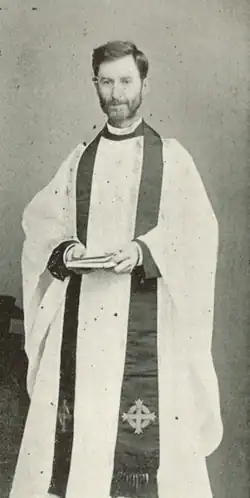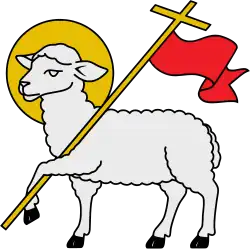Deaf theology
| Part of a series on |
| Theism |
|---|
Deaf theology is a modern theological perspective that frames theological issues through a Deaf lens. The scope of this topic is mostly Christian, however there do exist Deaf theologians of other faith groups as well.
Deaf people have been discussed since antiquity in theological spaces. Historically, theologians did not consider perspectives from Deaf people as equal. Most early discussion studying Deaf people and theology was done by hearing scholars. However, recently, many more Deaf theologians have been making themselves known. This was due in part to the fact that American Sign Language was not recognized as a legitimate language until linguistics scholars further studied it in the 1960s.
Many early leaders in the Deaf community such as Thomas Hopkins Gallaudet earned credentials in theology[1] leading them, because of their faith, to establish Deaf institutions of learning in the United States on the basis of charity. Deaf theology breaks away and establishes independence as its own perspective on Deafness and religion by embracing Deaf identity instead of attempting to integrate Deaf people into hearing religious life.[2]
Early History
Earlier history than the 1800s regarding Deaf theology and Deaf people in church spaces is scarse but existent. Deaf people have faced some exclusion from traditional church spaces dating back to the Apostolic Canons.[3] With the canons stating that deaf and blind people were not allowed to be bishops.
Saint Augustine used the example of Deaf people in De Magistro to illustrate that he believed signs could not receive worship. Some later Deaf scholars hypothesize that Saint Augustine believed that the Deaf could receive the same worship as hearing people.[4]

18th-19th Century
There were numerous factors leading to the creation of Deaf theology as a topic. One of the factors was that Deaf educators Charles-Michel de l'Épée, Thomas Hopkins Gallaudet, and Thomas Gallaudet (priest) were all invested in theology making for a strong theological foundation. l'Épée started teaching Deaf people to provide them with the sacraments.[5] The first Deaf church in the United States was founded in 1852.[6]
By 1883, Henry Winter Syle was ordained as a priest in the Episcopal Church in the United States. He was the first Deaf man to become a clergyman in the United States. Syle was heavily influenced by Thomas Gallaudet (priest). In England, in 1885, Richard Aslatt Pearce became the first Deaf clergyman in the Church of England. Notably, Pearce started gathering Deaf adults together for worship on Sundays. Syle also started gathering Deaf adults together by establishing a congregation in 1888.[7]
20th Century
In some contexts learning sign language was encouraged for Ministers.[8] This was encouraged at a point in time where sign language had been largely banned in the classroom due to the Milan Conference.
Discussion of how to best include Deaf people in theological spaces continued through the 1970s. [9]
Liberation Movement
Deaf liberation theology is a modern theological perspective which originated among Deaf theologians and scholars. A sub-field of liberation theology, it contextualizes Christianity in an attempt to try and help Deaf scholars understand their faith in a largely hearing world.[2]
Deaf theology largely focuses on framing Christian theology as a tool Deaf people can use to resist oppression stemming from audism. Additionally it views Deaf people as an oppressed linguistic minority.[10] Deaf people are often excluded from traditional church spaces and sermons due to a lack of interpreters, as well as stigmatisation and prejudice.[2] This is why Deaf theology was created as a concept, it allows Deaf people to organise and experience faith in an environment that is inherently more welcoming and accepting
| This article is part of a series on |
| Christian socialism |
|---|
 |
The emergence of Deaf theology as a topic dates to March 1985 a group of 10 hearing and Deaf theologians gathered at the Claggett Retreat Center in Maryland to write “a statement of our shared faith, hurts, and hopes”. This statement later became known as the Claggett Statement.[2] This document was also simultaneously made available signed in ASL.
In 2003 a conference was held at to discuss Deaf theology Catholic University of Leuven.[11] This event proposed the idea of Deaf Theology as a unique progressive christian movement and separated it from being grouped into existing movements as it had been previously. Later, in 2004, theologian Roger Hitchling wrote about the relationship of Deaf people to the Church in The Church And Deaf People: A Study Of Identity, Communication And Relationships With Special Reference To The Ecclesiology Of Jürgen Moltmann.[12]
This work went on to inspire other authors such as Hannah Lewis to write Deaf Liberation Theology in 2007. These works helped solidify the legitimacy of Deaf theology as both an academic field and a lived experience.[13] Lewis highlighted how certain Deaf-centric elements need to be included in Deaf church spaces to make them accessible to Deaf theologians. One of these concepts she advocated for the inclusion of was DeafSpace.[13]
After this, in 2008, author Wayne Morris wrote Theology without words: theology in the deaf community: explorations in practical, pastoral and empirical theology.[14]
In 2011, Bob Shrine wrote about the topic of Deaf Liberation Theology in The church and the deaf community: a liberation perspective from a linguistic-cultural minority[15]
Most recently, in March 2025, a symposium between Gallaudet University, an American university for the Deaf, and the College of the Holy Cross was held to discuss the Claggett Statement and its implications on Deaf theology today.[16]
The Claggett Statement
The Claggett Statement is a central document outlining the foundation of Deaf theology. This document depicts Deaf people worldwide as having a shared heritage of oppression, as well as having a low sense of self-worth often seeing themselves as spiritually inferior to hearing persons. It also discusses how religion is often used against Deaf persons, telling them to stop being “deaf” and try to be “hearing" in order to fit into hearing congregations. Additionally, the document calls for the creation of a form of worship that is indigenous to the Deaf community and affirms American Sign Language as a worthy language for teaching about the gospel.[2]
Perception of God
Reverend Anthony Russo, a Catholic leader in the Archdiocese of Philadelphia, preformed a study in the early 1970s on Deaf people in an attempt to understand how Deaf people perceive God. Russo found that the Deaf people he studied have an anthropomorphic idea of God. Additionally, he brings up the concern of classical theism being diffcult for Deaf people, who rely on ASL to interpret given the scarcity of adequate theological resources in ASL. [17]
Deafness and Judaism
There exist deaf synagogues and deaf Jewish community centers, such as, the Hebrew Seminary of the Deaf in the United States. The Hebrew Seminary of the Deaf provides an estimate of 50,000 deaf Jewish people living in the United States. [18]
The conservative movement within Judaism through the Committee on Jewish Law and Standards unanimously passed a ruling in 2011 that stated that Deaf people were no longer regarded as mentally incapacitated. Additionally, signed language was recognized as equal allowing greater freedom of language for deaf people within the conservative movement.[19]
Notable Deaf Theologians
- Henry Winter Syle - First ordained Deaf Episcopal Priest in the United States
- Richard Aslatt Pearce - First Deaf Anglican Priest
- Cyril Axelrod - deafblind Catholic Priest
- William Clark - Anglican Priest
- Dobri Dobrev - Bulgarian Orthodox ascetic
- Rebecca Dubowe - Rabbi
- Donald Fairbairn - Religious Scholar
- John Kitto - Cornish Biblical scholar
- Francis Maginn - Church of Ireland missionary, co-founder of the British Deaf Association
- Tom Osmond and George Virl Osmond Jr. - First Deaf missionaries from the LDS movement, also members of the Osmond family
- Lloyd Howard Perkins - First Deaf Bishop in the LDS movement
See also
- Black theology
- Christian communism
- Christian socialism
- Deaf education
- Deaf studies
- Feminist theology
- Liberation theology
Notes
- ^ Gallaudet, Edward Miner (1888). Life of Thomas Hopkins Gallaudet founder of deaf-mute instruction in America. Henry Holt & Co. pp. 38–40.
- ^ a b c d e "The Claggett Statement". 1985.
- ^ Schodde, George H. (June–December 1885). "The Apostolic Canons, Translated from the Ethiopic". Journal of the Society of Biblical Literature and Exegesis. 5 (1/2): 61–72. Retrieved August 18, 2025.
- ^ Saint Augustine of Hippo (1938). Concerning the Teacher (De Magistro) and On the Immortality of the Soul (De Immortalitate Animae). New York, London: D. Appleton-Century Company, Incorporated.
- ^ de L'Épée, Charles-Michel; Green, Francis (1801). The Method of Educating the Deaf and Dumb; Confirmed by Long Experience. London: George Cooke, Dunstan's Hill.
- ^ "St. Ann's Church for the Deaf". Episcopal Diocese of New York. Episcopal Diocese of New York. n.d. Retrieved August 18, 2025.
- ^ Leslie, Frank; Deems, Charles Force; Thomas De Witt Talmage (2011) [25 January 1886]. Talmage, Thomas De Witt (ed.). Frank Leslie's Sunday Magazine (PDF). New York, NY: Nabu Press (originally published by Frank Leslie's Publishing House). p. 434. ISBN 978-1246600933. Retrieved August 18, 2015.
The first deaf mute clergyman in the United States was the Rev Henry WL Syle who was ordained deacon by Bishop Stevens of Pennsylvania in Philadelphia in October 1876 and advanced to the priesthood in 1883
- ^ Michaels, John Walter (1923). A Handbook of the Sign Language of the Deaf: Prepared Especially for Ministers, Sunday School Workers, Theological Students and Friends of the Deaf. Home Mission Board, Southern Baptist Convention.
- ^ van Eijndhoven, J., ed. (1973). Religious Education of the Deaf: Proceedings of the International Catholic Conference on Religious Education of the Deaf, Dublin, July 1971. Rotterdam: Rotterdam University Press. p. 168.
- ^ Lewis, H. (2017). "Deaf Liberation Theology and Social Justice". Religions. 8 (10): 232. doi:10.3390/rel8100232. ProQuest 1965650270.
- ^ Broesterhuizen, Marcel (2007). The Gospel Preached by the Deaf: Proceedings of a Conference on Deaf Liberation Theology, Held at the Faculty of Theology of the Catholic University of Leuven (Belgium), May 19th, 2003. Peeters Publishers. ISBN 978-90-429-1854-2.
- ^ Hitching, R. (2003). The Church and Deaf People: A Study of Identity, Communication and Relationships with Special Reference to the Ecclesiology of Jürgen Moltmann. Paternoster Press.
- ^ a b Lewis, Hannah (2007). Deaf Liberation Theology. Taylor & Francis Group. p. 221.
- ^ Morris, W. (2008). Theology Without Words: Theology in the Deaf Community. Ashgate Publishing.
- ^ Shrine, B. (2011). The Church and the Deaf Community: A Liberation Perspective from a Linguistic-Cultural Minority. Grove Books.
- ^ Vasishta, Neerja (2025). "Symposium shines a light on Deaf Liberation Theology".
- ^ Russo, Anthony (1974). The God of the Deaf Adolescent. Paulist Press. p. 189-192.
- ^ "Hebrew Seminary – A Rabbinical School for Deaf and Hearing". Archived from the original on May 17, 2014. Retrieved August 18, 2025.
- ^ Tomchin, Susan (April 2012). "Hearing the Needs of the Jewish Deaf". Jewish Women International. Archived from the original on September 28, 2015. Retrieved August 18, 2025.
References
- "The Claggett Statement". 1985.
- Lewis, H. (2017). "Deaf Liberation Theology and Social Justice". Religions. 8 (10): 1. doi:10.3390/rel8100232.
- Broesterhuizen, Marcel (2007). The Gospel Preached by the Deaf: Proceedings of a Conference on Deaf Liberation Theology, Held at the Faculty of Theology of the Catholic University of Leuven (Belgium), May 19th, 2003.
- Hitching, R. (2003). The Church and Deaf People: A Study of Identity, Communication and Relationships with Special Reference to the Ecclesiology of Jürgen Moltmann. Paternoster Press.
- Lewis, Hannah (2007). Deaf Liberation Theology. Taylor & Francis Group. p. 221.
- Morris, W. (2008). Theology Without Words: Theology in the Deaf Community. Ashgate Publishing.
- Shrine, B. (2011). The Church and the Deaf Community: A Liberation Perspective from a Linguistic-Cultural Minority. Grove Books.
- Vasishta, Neerja (2025). "Symposium shines a light on Deaf Liberation Theology".